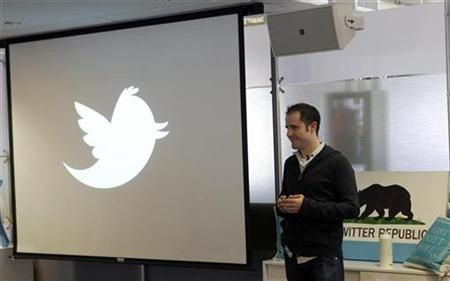'Blue Monday' is ushered in as debate goes on if it's a marketing stunt

Wondering why everyone on Twitter and Facebook are feeling blue today? January 17, 2010 happens to be the third Monday of January, which makes it the 'Blue Monday', supposedly the most depressing day of the year. The debatable tradition, which began six years ago, continues to draw believers as well as wide-spread criticism as the idea is said to have been born out of a publicity stunt to gain marketing momentum.
Twitter turns Blue
I'm definitely feeling #bluemonday, tweeted Jack93 (Jack Stuart).
Another user, anokhimadhavji, posted Today is meant to be the most miserable day of the year! I certainly feel miserable. Morning! #bluemonday
But on the positive side, the posts were not all negative. There are forces in the Twitterverse that are trying to brighten up the world and dispel the 'blue Monday' tradition.
So apparently today is Blue Monday; Christmas is far away & it's the middle of a long month, but we all seem to be in a good mood here... tweeted Periscopix.
Urging people to smile, SyamingLi tweeted, Today is apparently Blue Monday. In my mind, Blue = Sonic so therefore THIS IS A GOOD DAY. SMILE.
In an attempt to stop the 'blue monday' madness with the reality behind the tradition, Chris_coltrane wrote: I expect everyone knows by now that Blue Monday was invented by a PR company, using pretend maths.
How it began...
Chris_coltrane is right. Six years ago, a PR company paid Welsh psychologist Cliff Arnall to formulate an equation to calculate the most depressing day of the year, as part of a publicity campaign by Sky Travel. Despite questions and criticism against the maths used to derieve the depressing day of the year, the 'Blue Monday' took off.
In a press release under the name of Cliff Arnall, at the time a tutor at the Centre for Lifelong Learning, a Further Education centre attached to Cardiff University, the date was released with the formula: frac{[W + (D-d)] times T^Q} {M times N_a}.
A campaign encouraging the British public to overcome the winter blues is being launched to raise people's spirits and vital funds for the Mental Health Foundation in the run up to the year's most depressing day - 'Blue Monday' on 19 January 2009, the press release said, adding that campaign website, Beatbluemonday.org.uk, features advice to help people.
Advice to get through Blue Monday included:
* Keep active
* Eat well
* Keep in touch
* Care for others
* Do something you are good at
* Ask for help
* Accept who you are
* Talk about your feelings
* Take a break
* Drink sensibly
According to a Guardian columnist back then, Dr Ben Goldacre, the press release was delivered substantially pre-written to a number of academics by Public Relations agency Porter Novelli, who offered them money to put their names to it.
You might remember Dr Cliff Arnall. He is probably the most prodigious of all producers of bogus equations: proving that some arbitrary date in mid-January is the most miserable day of the year for Sky Travel; proving that some arbitrary date in mid-June is the happiest day of the year for Walls ice cream; and so on, the columnist wrote for the Bad Science Series.
Cardiff University also distanced itself from Arnall.
However, taking into account non-mathematical factors like weather, post-Christmas or post-holiday gloom among others, the third Monday of January may actually turn out to be a depressing day.
Moreover, in a later press release commissioned by Wall's ice cream, Mr Arnall claimed that he had also calculated the happiest days of the years 2005, 2006, 2008, 2009, and 2010. All of these dates fell in June, close to midsummer - a time of the year when midsummer-related holidays, traditions, and celebrations of pre-Christian origin begin to kick start across Europe.
Blue Monday as a Marketing Tool Vs Cyber Monday
Provoking unhappiness is often seen as an effective method of manipulation. It can be observed in advertising strategies as well. Ads often show people sulking over something in life, before a magical product, be it a moisturiser or a very expensive car, comes along and turns the world upside down.
Blue Monday is, therefore, nothing but a marketing tool to many agencies. Take for instance the tweets below:
Beat #BlueMonday, send a #ChocolateBouquet!, read a tweet from the flowerstork (The Flower Stork), the account of South Wales Gift Bouquet Company which boosts of Award winning Baby Clothes Bouquets and Chocolate Bouquets
Cannot shake this under the weather feeling. bleugh.. #bluemonday What supplements good for building up immune system? tweeted Killerton Estate, a 200 year old mansion on a 6,400 acre National Trust estate that produces award-winning cider, honey, chutney, charcoal & flour.
RedLetterDaysUK (Red Letter Days), UK's leading provider of gift experiences and unforgettable days out, tweeted, We can't have u feeling the blues on #bluemonday so who wants to #WIN a fab blues-busting Pamper Treat? RT 2 enter b4 3.
The more recent and more straightfoward rendering of a similar marketing tool is the 'Cyber Monday', which falls immediately after the Black Friday, the Friday following Thanksgiving Day in the United States. The campaign started by companies to encourage people to shop online began in November 2005, when Shop.org, an association for retailers that sell online, released a statement claiming 'Cyber Monday' Quickly Becoming One of the Biggest Online Shopping Days of the Year.
The trend began to drive discounts and heightened online shopping activity in 2005 itself. In 2006, Shop.org launched the CyberMonday.com, a one-stop shop for Cyber Monday deals. In 2009, consumers spent $887 million online on Cyber Monday, making it the second highest spending day of the year. Soon the term Cyber Monday and its effects spread its reach to countries like Canada, UK, Portugal among others.
© Copyright IBTimes 2025. All rights reserved.





















